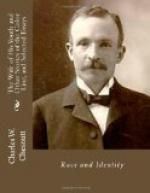Mr. Ryder resolved that this ball should mark an epoch in the social history of Groveland. He knew, of course,—no one could know better,—the entertainments that had taken place in past years, and what must be done to surpass them. His ball must be worthy of the lady in whose honor it was to be given, and must, by the quality of its guests, set an example for the future. He had observed of late a growing liberality, almost a laxity, in social matters, even among members of his own set, and had several times been forced to meet in a social way persons whose complexions and callings in life were hardly up to the standard which he considered proper for the society to maintain. He had a theory of his own.
“I have no race prejudice,” he would say, “but we people of mixed blood are ground between the upper and the nether millstone. Our fate lies between absorption by the white race and extinction in the black. The one does n’t want us yet, but may take us in time. The other would welcome us, but it would be for us a backward step. ’With malice towards none, with charity for all,’ we must do the best we can for ourselves and those who are to follow us. Self-preservation is the first law of nature.”
His ball would serve by its exclusiveness to counteract leveling tendencies, and his marriage with Mrs. Dixon would help to further the upward process of absorption he had been wishing and waiting for.
II
The ball was to take place on Friday night. The house had been put in order, the carpets covered with canvas, the halls and stairs decorated with palms and potted plants; and in the afternoon Mr. Ryder sat on his front porch, which the shade of a vine running up over a wire netting made a cool and pleasant lounging place. He expected to respond to the toast “The Ladies” at the supper, and from a volume of Tennyson—his favorite poet—was fortifying himself with apt quotations. The volume was open at “A Dream of Fair Women.” His eyes fell on these lines, and he read them aloud to judge better of their effect:——
“At length I saw a lady within call,
Stiller than chisell’d
marble, standing there;
A daughter of the gods, divinely
tall,
And most divinely fair.”
He marked the verse, and turning the page read the stanza beginning,——
“O sweet pale Margaret,
O rare pale Margaret.”
He weighed the passage a moment, and decided that it would not do. Mrs. Dixon was the palest lady he expected at the ball, and she was of a rather ruddy complexion, and of lively disposition and buxom build. So he ran over the leaves until his eye rested on the description of Queen Guinevere:——
“She seem’d a part of joyous Spring;
A gown of grass-green silk she wore,
Buckled with golden clasps before;
A light-green tuft of plumes she bore
Closed in a golden ring.




